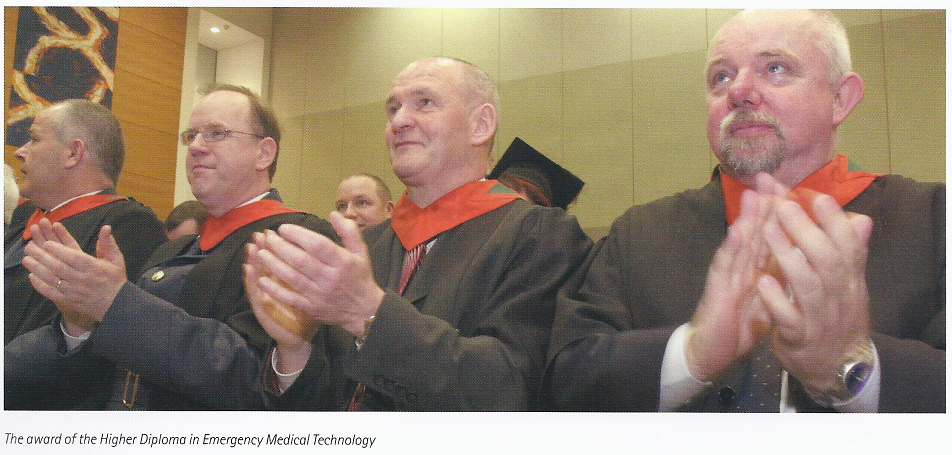 Practitioner Membership - PHECC Register Committees
Practitioner Membership - PHECC Register Committees
A registered practitioner's compliance with the Code of Professional Conduct and Ethics in conjunction with that practitioner's adherence with the PHECC CPGs when providing patient care may be the subject of scrutiny.
This article concentrates on the issue of registered practitioner participation on the PHECC Register Committees. Registered practitioners' input will be required when addressing some of the issues and questions proposed.
Fitness to Practice - What is it?
You cannot hove a professional healthcare register without a Fitness to Practice facility.
A draft proposal explaining Fitness to Practice (FTP)was first published in the May 2005 issue of the PHECC Voice. FTP was also one of the issues discussed during the national consultation exercise concerning the Register last year.
The ability/authority to administer medications comes solely from a practitioner's membership of the Register. However along with the authority to administer medications comes the responsibility to practice safely. If practitioners are not practicing competently and/or safely there must be a mechanism or way to review practice. This mechanism is called the Fitness to Practice Committee.
FTP, why have it or what does it do?
Fitness to Practice is there in order to;
- Ensure the good name of the profession
The Public are protected by having a Fitness to Practice regime in place which will identify unsafe and/or incompetent practice. Practitioners are protected by the inclusion of their fellow professionals in the composition of the Fitness to Practice Committee and relevant supporting sub committees. And the profession is protected by ensuring that practitioners who act Incompetently are identified. The process is external to the normal
IR mechanism. It is not a tool that can be used by management to discipline practitioners nor is it a hiding place to protect incompetent practitioners.
Registered practitioner - panel membership
The FTP committee membership and supporting committees are composed of persons who are members of the PHECC Register drawn from a standing panel nominated by the profession, the Chairperson (Council Member) and others, such as patients' representatives, employer representative and a representative of the medical profession.
Registered practitioner representation on the Committee and sub committees are as follows;
- Fitness to Practice - Two persons who are members of the PHECC Register drawn from a standing panel nominated by the profession.
- Preliminary Proceeding Sub Committee (Screening) - Three PHECC registered practitioners drawn from a standing panel nominated by the profession.
- The Health Sub Committee - Two persons who are members of the PHECC Register drawn from a standing panel nominated by the profession.
Some of the issues which require clarification are - How many nominees do we need? Should we have alternates? (to ensure adequate provision for annual leave etc). How are they to be nominated by the profession? What is the duration or life of a nominated panel? Will panel members receive training? How will committee members be selected from a panel to form a sub or main committee?
PHECC is seeking registered practitioners' opinion on these issues. This is your profession and your Register. Some suggestions on these issues are considered for your consideration elsewhere in the newsletter.
Forming a Committee - Guiding Principles
How will individuals be selected from the profession's nominated panel to participate on either the FTP Committee or any of the Sub Committees?
It will be the Registrars function to select individuals to comprise the membership of the various committees. The Registrar will select individuals from the panel nominated by the profession, panels of other nominations and the Chairs will be appointed by Council. In making selections the Registrar will be guided by certa in principles. Some of the suggested guiding principles are;
- Committee members may not review an allegation/complaint against a practitioner working in the same area/region.
- Committee members will be expected to excuse themselves if they have had any personnel/professional contact with the subject of an allegation/complaint.
- The Registrar must make provision to ensure adequate service representation. This applies particularly in the Dublin Metropolitan area.
- Except in exceptional circumstances screening committee members may only review allegations/complaints against practitioners at their own equivalent level or lower on the Register.
- Provision must be made to ensure adequate geographical representation on committees. (Countrywide representation).
Representation Proposal
In order to ensure that there is adequate geographical representation PHECC would propose that the PHECC Register regions for FTP purposes would be aligned with the HSE Administrative Regions and that there would be special provision for the Dublin Metropolitan Area. This would mean that there would be four distinct regions in the country.
(Continued in next column....)
|
|
(Continued from previous coloumn....)
The net effect of this would be that where an allegation or a complaint is made against an individual from one region, it would be proposed that the registered PHECC Practitioners on the screening committee would consist of one member from each of the other three areas or regions.
Dublin Metropolitan Area - Special Provision
The Dublin Metropolitan Area is divided in two by the new HSE Administrative Regional Structure consisting of Dublin/North-East and Dublin/Mid-leinster. PHECC would propose that there should be a service balance in each of these two regions to accommodate the different statutory services operating there.
Such a proposal would see service alternates available for selection as well as geographic alternates. This would mean that the service alternates would consist of a HSE member from North of the Liffey along with a DFB member from North of the Liffey and likewise a HSE member from South of the Liffey along with a DFB member from South of the Liffey.
How will this operate in practice?
The provision for adequate service representation on the screening committee would be implemented as follows;
- When an allegation or complaint is made against the HSE Practitioner from Dublin/North- East (North of the Liffey) then the composition of registered practitioners on the Screening sub committee would be as follows; 1 from HSE West, 1 from HSE South, 1 from HSE Dublin/Mid Leinster. The situation would be vice versa for South of the Liffey.
- Likewise if thre was an allegation or complaint against a DFB practitioner North of the Liffey then the composition of practitioners on the Screening sub committee would be, 1 HSE West, 1 from HSE South, 1 from DFB Dublin/Mid-Leinster and vice versa for South of the Liffey.
Practitioners Panel - How many members are required?
Returning to the question posed earlier how many panel members will be required? PHECC need your advice and assistance in this matter in order to make provision for members to avail of annual leave etc there will be a requirement to have sufficient members on the panel. If we assume that alternates would be required for both geographic and for service representation then PHECC would propose the following;
- Three registered practitioners from each region of the four HSE regions which would be a total of twelve HSE personnel.
- Making special provision for the Dublin Metropolitan Area there would also be a service balance resulting in a requiremnt for three DFB practitioners North and three DFB South, a total of six.
Therefore in all a total of eighteen individuals are required.
Needless to say once these individuals are selected they will have to receive training to assist them in carrying out their functions. The question remains how they will be nominated.
Registered Practitioner Panel Membership
How will individuals be nominated and the issue of filling the practitioner panel needs to be resolved? This is an important issue. Accepting the principle of the four HSE regions and the need for service and geographic alternates:
- How are individuals nominated and selected to fill the positions?
- Should there be an election in each of these constituencies/regions/services?
- Should there be a screening process to ensure that individuals who are nominated are competent and capable? If an individual is going to be participating in a Fitness to Practice hearing then it goes without saying that the individual must be competent and have a track record of competency.
- How long should membership be for, should it be for a fixed period? What about building up experience?
- Who should be on the selection panel apart from Council members? (IR Rep?)
- Lay representation could be a valuable asset to feed into such a process at this stage.
All of these issues need to be addressed and it is essential that the registered practitioners participate and contribute.
Consultation
PHECC are aware that this process is bringing forward many questions. This is only to be expected as the profession is entering onto a new level or plain. These queries are just some of the issues which need to be clarified.
In addition to this newsletter PHECC will write to all registered practitioners on the PHECC Register to canvas their ideas in relation to this next step. PHECC will also conduct a consultation tour and visit each of the four regions and services and invite feedback from members.
As the Register is already in place this is an urgent requirement which needs to be given highest priority.
|
